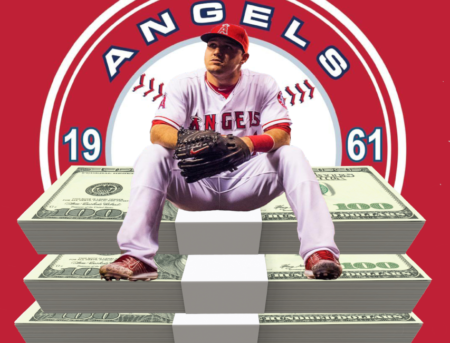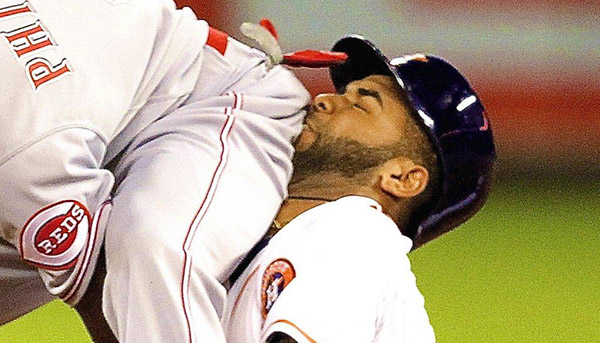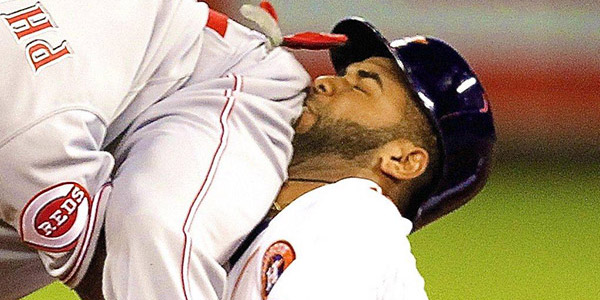Mike Trout $430 Million Contract: Lunacy or Sanity?
The Value of Must-See At-Bats
 From collusion to lunacy, that’s the range of economy in Major League Baseball. First there wasn’t even one contract this past offseason that approached the $300 million stratosphere, and then Manny Machado and Bryce Harper both reached and cracked $300 million. Why? Because both of these players partake in must-see at-bats.
From collusion to lunacy, that’s the range of economy in Major League Baseball. First there wasn’t even one contract this past offseason that approached the $300 million stratosphere, and then Manny Machado and Bryce Harper both reached and cracked $300 million. Why? Because both of these players partake in must-see at-bats.
Mike Trout, considered the best player in the sport, signed a 12-year, $430 million contract. Trout will be 28 years old during the 2019 season. The average yearly compensation of his new contract will be $35.8 million for each season until the contract concludes during Trout’s age 40 season. Every one of Mike Trout’s must-see at-bats will be worth $57,000.
There’s no doubt what Trout has accomplished in the first seven years of his extraordinary career. There’s no doubt that he’s hurtling across baseball diamonds everywhere on a fast track toward the Hall of Fame.
However, despite his numerous accomplishments—and there are too many to list here—there’s a question looming over this contract: Is Trout worth 12 years at $430 million? Are his at-bats really worth $57,000?
The opinion here? No.
What is Los Angeles Thinking?
Los Angeles is the same team that offered Albert Pujols a 10-year, $240 million contract, of which he is owed $87 million for the final three baseball seasons: 2019, 2020, and 2021. This after two mediocre Triple A quality performances the prior two seasons (2017, 2018). Pujol’s at-bats were electric in St.Louis. Not so much in Los Angeles. But, expensive as he is, his contract has not limited the moves Los Angeles can make Anaheim-land.
Witness these few moves.
Josh Hamilton signed a five-year, $115 million contract in 2013 at his age 32 season. Hamilton only played two seasons for Los Angeles before they traded him back to Texas, paying $73.5 million of the $79.5 million that Hamilton was owed the last three seasons. So, all-in-all, Los Angeles paid $109 million for two seasons of Hamilton’s mediocre presence in their lineup. Then they desperately wanted to move his contract, and only Texas bit, but again, Texas was only willing to pay $6 million over two seasons. A pittance and a bag of balls, and Hamilton was theirs.
C.J. Wilson was the third free agent signed by Los Angeles. He signed a five-year $75 million contract in 2012, but only played four of the five years, ending his career in 2015. Los Angeles paid $20 million for Wilson’s last year, 2016. He did not throw one pitch for them.
On the contrary, Mike Trout’s first contact extension, a $144.5 million deal, concluded with the announcement of his new 12-year extension. There’s no question that Trout was worth every penny of the $76 million Los Angeles paid him over the first four years of his six-year deal. Now, the average annual salary Trout will be paid the next 12 years is slightly less than $36 million a year.
By signing Trout to this extension, Los Angeles removes two years of idle speculation that had already begun swirling around the game. Where would he play in 2021? Stories about Bryce Harper recruiting Trout for the Philadelphia Phillies were already circulating in the baseball press. The difference is now Los Angeles knows that Trout will be on their side. Great.
But …
Since 2012, Trout has appeared in one playoff series. Los Angeles lost that three-game series to the Kansas City Royals in 2014. And despite Trout’s brilliance, there have been no further postseason appearances. Why? Because baseball is a team game and one player, no matter how brilliant, even Mike Trout, cannot make a difference. Even if fans tune-in to see his every exploit.
So, what has Los Angeles signed up for? How many years will there be of Mike Trout excellence before old age catches up with him? Five years? Seven years? Couldn’t they extrapolate the decay in Albert Pujol’s performance during the course of his 10-year deal with Trout’s future decline?
And even if Trout is great, puts up the best numbers ever over 12 years, without a strong supporting cast Los Angeles will not make the playoffs. Meaning they’re throwing $36 million away every year they retain Mike Trout and do not make a postseason appearance—unless Trout is generating more money for the team as an entertainment icon on their cable telecast marquee.
If Los Angeles were to trade Trout right now—a great player signed to a long-term contract, even if it is the largest in major league history—teams like the Los Angeles Dodgers, Chicago Cubs, Boston Red Sox (perhaps), and Cleveland Indians (perhaps) would seriously consider adding a Hall of Fame bat to their lineups (and a Gold Glove center fielder to boot) and a real gold star to their television marquees. Only the length of contract might be an issue. Everyone knows Trout won’t be able to produce 12 great years because he’s a mere mortal in the end, subject to the laws of human evolution, despite his superhuman performance up to now. But his name is golden. Like Derek Jeter’s or Alex Rodriguez’s, who were still draws at the end of their careers, even when they could barely take the field, as long as they stepped up to the plate for their every must-see at-bat.
So, should Los Angeles have offered Mike Trout the contract? Depends on the economics of Angel telecasts with or without Trout. And Trout’s impact on Angel merchandising. Attendance. And other business arrangements.
All this against the return the Angels’ might have received in a trade. It’s possible the Angels might have received a treasure trove of baseball value, enough to have turned their team around quicker than by keeping Trout and hoping their future limited prospect base would pan out. Of course, Los Angeles might not win again during Trout’s coming dozen years, but they will make fistfuls of money. Every must-see at-bat.
So, it’s unclear whether this contract was an intelligent choice to mollify fans and buttress the franchise, or a desperate move by a franchise afraid of losing its greatest player in a few short years with nothing to show in return. Except his every must-see at-bat.
The real question: Is any player, from Mike Trout to LeBron James worth the millions of dollars they are paid?
Mike Trout will receive approximately $700,000 a week for the next 12 years. As nice a guy as Mike Trout probably is, and as great a player as he is, wouldn’t $200,000 a week ($10 million a year) be fair?
Yes, baseball is fun to watch. Yes, Mike Trout is a great player to watch. But, why is Mike Trout worth $228,395 per game? Why are his must-see at-bats worth $57,000 every time he steps to home plate?
No athletic performer is worth this kind of money. None. Yet baseball team owners feel compelled to break the bank for these players. Why? Because owners are not paying for players, they’re paying for performers. Freaks. Musclemen. Home run hitters. Strikeout artists. Digital action. On. Off. Not the old analog action that baseball used to represent. Mike Trout is now a must-see at-bat.
Mike Trout—as a performer on cable telecasts that net the Angels and other teams millions, if not billions of dollars—is worth his money to ownership who divide the very handsome profits his name on the marquee guarantees. With Trout as headliner, the Angels can put mediocre talent around him, still draw eyeballs to their games, and continue to overcharge for their entertainment product.
So, is Mike Trout’s contract lunacy or sanity? Perhaps, viewed outside the context of a baseball diamond, it makes economic sense, given what baseball has become. The minimum baseball salary of $550,000 per year paid to rookies and young players ensures the Mike Trout’s of the baseball world will earn their $700,000 weekly salaries while these other faceless and forgettable players are shuffled around the game from team to team. Released. Designated for assignment. Claimed. Released. Claimed again. Sometimes with days of each other. As if the name is a rootless robot without feelings, a family or a life. An athletic body and nothing else. These (reasonably) well-paid men are the have-nots of the game, even if their baseball careers only run five or six seasons. And their names blend together like verdant blades of grass that Mike Trout will lord over for the next 12 years.
Take them away, and there’s no game.

























